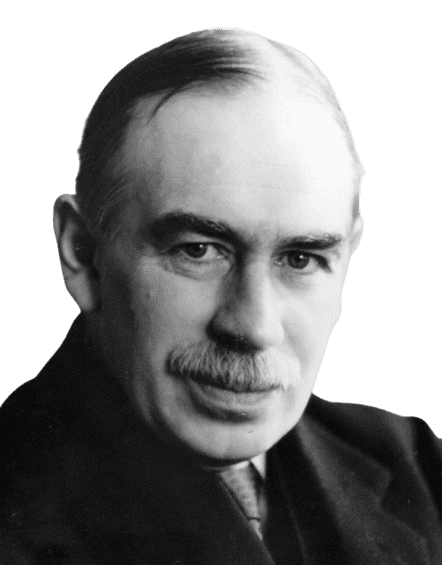Life and achievements
Early life
John Maynard Keynes was born in 1883 in Cambridge, England, to a very affluent family. His father, John Neville Keynes, was an economist and a lecturer at the University of Cambridge, while his mother, Florence Ada Keynes, was a social reformer. He was raised intellectually, and his parents influenced his education.
John Maynard Keynes, an influential economist of the 20th century, was educated at Eton College and King's College, Cambridge, where he majored in mathematics. When Keynes was at Cambridge, he was under the tutelage of Alfred Marshall, an essential economist of that age, and Arthur Pigou.
However, he also became quite interested in philosophy, especially the philosophical works of G. E. Moore. Education and intellectual surroundings contributed to the development of his analytical mind and provided the basis for his future work in economics. Keynes began his career in the civil service after he got his degree in 1905.
He worked at the India Office in London but got bored with bureaucratic work and returned to Cambridge to lecture and indulge in his academic aspirations. His first economics article was about Indian currency and was published in finance in 1913.
Legacy
There is no doubt that Keynes left a great impact on economic theory and policymaking worldwide. His theory of economic intervention revolutionized economic policies globally, especially after the Great Depression and World War II. His theories led to the formation of Keynesian economics, which is still the central economic theory in practice, although it faced competition from monetarist and neoclassical theories.
It is necessary to note that Keynes's impact was not limited to academia. He played a significant role during the Bretton Woods Conference, which resulted in the creation of the IMF and World Bank in the post-war world. They are still important players in the governance of the world economy.
The Keynesian policies were most popular after World War II and played a significant role in economic growth and low unemployment in Europe and America. However, his impact was less felt in the 1970s due to the emergence of neoliberalism, but his theories were relevant during the 2008 financial crisis.
The Keynesian approaches were revived in global policy circles, particularly the idea of government expenditure to pull struggling economies out of the cycle, thus immortalizing Keynes's contribution.
Milestone moments
Feb 22, 1936
Release of The General Theory of Employment, Interest, and Money
Keynes's most significant work published is The General Theory of Employment, Interest, and Money.
Keynes presented a new approach to economics in this book, extending his view that aggregate demand determined employment and output.
It questioned some of the fundamental theories of the classical economists about free markets and employment.
Some of Keynes's ideas, which became the foundation of Keynesian economics, influenced economic policy worldwide.
Jul 17, 1944
Bretton Woods Conference
John Maynard Keynes played a central role in the Bretton Woods Conference that created the international monetary framework in the aftermath of the Second World War.
He was also instrumental in the formation of the International Monetary Fund (IMF) and the World Bank, which were intended to stabilize the world economy.
Although he could not implement a much more drastic change in the global financial system and introduce an international currency called bancor, his impact remains significant.
This conference has become the basis of the modern world trade and financial system and contributed significantly to developing Keynes's ideas in international economics.
Sep 25, 1940
How the War Will be Financed
At the same time, Keynes wrote a book titled How to Pay for the War, which contained ideas on financing the British side of the Second World War.
He supported views that called for raising taxes and mandatory saving to avoid going for deficit spending, which fuels inflation.
This approach was innovative because it wanted to accommodate the needs of wartime and post-war economic reconstruction and ensure the shifting of resources once the War was over.
Keynes's ideas about running the war economy in Britain without causing severe inflation showed that he was efficient in his economic policies.
Jun 6, 1942
Nobility and Position in the Management of Britain
In June 1942, Keynes created a life peerage and became the first Baron Keynes of Tilton for his services to economic thought and policy.
He was also becoming increasingly involved in the post-war economic reconstruction of Britain and the transition from a war economy to a peace economy.
This was seen in policies that sought to avoid another depression through employment and economic progress.
During this period, his position was established as an economist and a British government official and diplomat.
